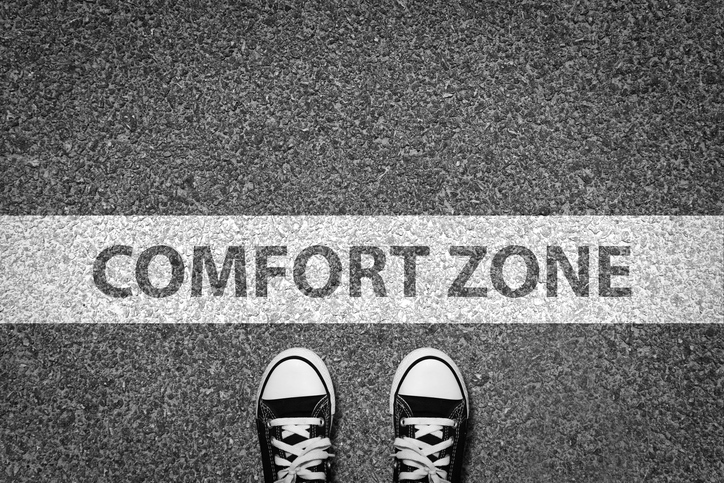| Equity & Diversity
Comfort zones

Hi, as part of our Neurodiversity Celebration Week, today one of our Academics, Dr Richard Cook PHD, is our guest blogger who is also a member of our Staff Neurodiversity Hub.
I was reminded recently in a conversation that often we take our own personal circumstances for granted, unintentionally overlooking how uncomfortable the world can feel for others. Particularly for some who struggle in ableist cultures or workplaces.
Comfort zones are funny things because they are personal. Some people are quite at home (comfortable) in busy social scenes or presenting to large audiences whilst others prefer one to one scenario or perhaps avoid ‘the social’ altogether. What’s comfortable for you might not be comfortable for me and vice versa. But most people would agree that the basic, everyday things that we do mean we mostly operate in a ‘comfort zone’ throughout the everyday of our daily lives. E.g. With ease, we choose our clothes for the day, we get the bus or train to work, we interact with colleagues, we socialize with them at lunch or breaks (or after work) and we might enjoy a meal out with a partner or go to the cinema etc.
However, this ‘normal’ day can be very different when you factor in neurodiversity (ND) such as Autism. For this typical day, choosing clothes can be problematic as some items simply feel weird or there may be a preference for an item which it is not possible to determine confidently if it is appropriate or within social norms. In some instances, collars or tags, textures or smells might make an item unwearable. Many clothes might be tested and rejected or decision making difficult. Getting up, ready and out can be a battle. Traveling by train or bus might be problematic because of close contact with other people, the stress of finding a seat or the thought of it being late. From a sensory perspective, traveling – loud noises, talking people, too many people, jostling, times and platforms, all inputs that can be overwhelming.
At work, interactions with colleagues or determining suitable or appropriate answers or picking up on social clues can make most encounters an area to be wary of and introduce stressors and be tiring. E.g. You might miss an opportunity where empathy was required or jump to talking about yourself or monologue about something when you should have been listening, and so on. Lunchtime where chit chat and conversation can be fluid or follow multiple threads or have implicit meanings or hidden social clues is again a troublesome scenario. Again, difficult, tiring and stressful.
These intense experiences then accumulate throughout the day into one giant mass of stress. By the time you get home you might be mentally exhausted or hyper-stimulated and need to decompress or burst (meltdown). The normal day viewed through the ND lens demonstrates that there is a bigger demand placed on a person with ND just going about the normal day (Google: ‘Autism masking’ or ‘Autism camouflaging’). This is assuming that there are no ‘reasonable adjustments’ put in place to provide some help.
What does this feel like if you aren’t ND? For a small insight, consider this analogy. You are on holiday in a bar where you don’t speak the language. You’re going to be there al day. You won’t really know what’s going on and look to others to know when to laugh and so on – you participate through guesswork and accept risks and failure as normal. This carries on until the day ends. An everyday occurrence in a bar, a normal social situation comes with an added demand because it means you are in an ‘un-comfort zone’. As a one off probably not too bad but consider this is your everyday and forever over your lifetime. Everyday you will struggle to understand people and will likely make mistakes and may offend or grate on people. There are then the wider effects such as self-doubt, a sense of failing and absorbing stress (uncomfortableness).
I think this is why talking about hidden disabilities such as ND and making them part of the conversation is important. These extra demands placed on ND people mean they encounter the normal everyday as incredibly taxing and tiring so often fail to thrive or achieve their potential and self-exclude by opting out or avoidance. Perhaps things needn’t be like this.



